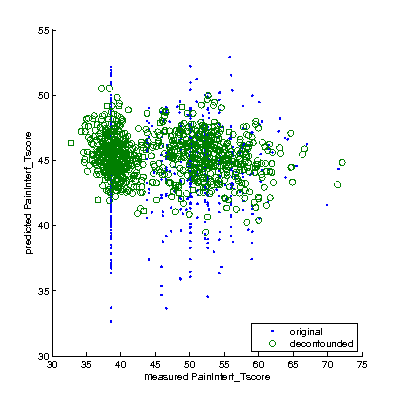back to index
Correlation/prediction results for subject measure 473 (PainInterf_Tscore)
818 subjects had a valid PainInterf_Tscore measure.
Multivariate prediction (GLM-based, automatic feature selection, leave-one-family-out prediction)
Original data space: r=-0.04 CoD=-0.21 Deconfounded space: r=-0.13 CoD=-0.10
Scatterplot shows predicted-PainInterf_Tscore vs measured-PainInterf_Tscore (in original and deconfounded data space).
Univariate regression (regressing each netmat element independently against PainInterf_Tscore, correcting for multiple comparisons across elements, using PALM permutation testing, taking into account family structure).
Number of significantly correlated edges at p<0.05 (two-tailed, FWE corrected) = 0 (minimum corrected p = 0.4358)
Number of significantly correlated edges at p<0.05 (two-tailed, uncorrected) = 53 (62 expected by chance)
Image shows edges (node-pairs) whose connection most strongly correlates with PainInterf_Tscore (in decreasing order), with t-statistic listed at the top of each node-pair.


